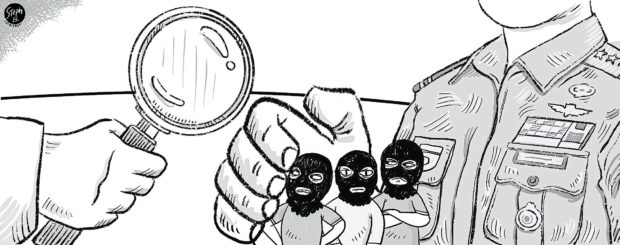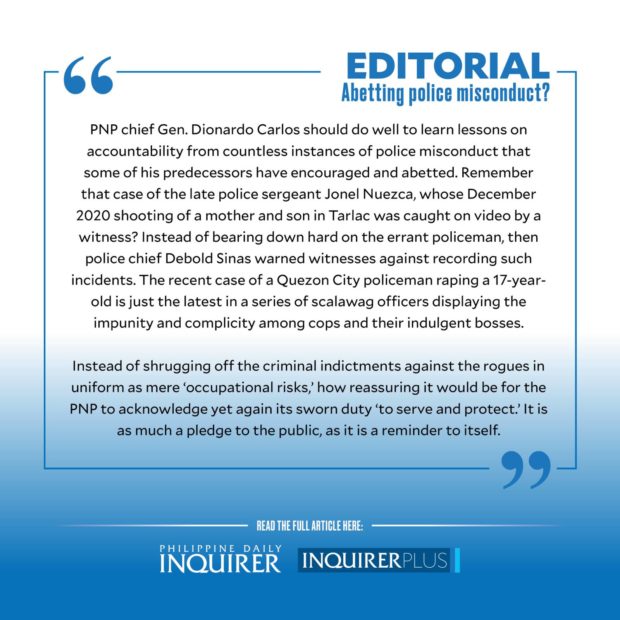Abetting police misconduct?
News about the filing last week of criminal raps against policemen in an almost forgotten case offered some hope for the country’s erratic justice system.
On Friday, the National Bureau of Investigation (NBI) filed a murder complaint against 17 members of the Philippine National Police’s (PNP) Criminal Investigation and Detection Group (CIDG) in connection with its Batangas operation that resulted in the death of activists Ariel Evangelista and his wife, Ana Mariz, on March 7, 2021.
The raiding team claimed the couple’s death was the result of a “gunfight.’’ But the NBI said that based on evidence and eyewitness accounts, the deaths had the “peculiar nature of extrajudicial killings,” and “reveal(ed) the [officers’] deliberate intent to kill.”
The raid was part of a bigger operation jointly conducted by the police and the military in the Calabarzon region, which militant groups would later condemn as the “Bloody Sunday” massacre since the simultaneous raids resulted in the death of nine activists.
The Evangelistas were members of a community organization that monitors the impact of ecotourism projects in Batangas, according to the human rights watchdog Karapatan. Aside from the couple, six others were killed in Rizal province and another in Cavite. The operations also led to the arrest of six people.
The NBI noted that the police informant had “wrongfully” tagged the couple’s residence, and that instead of just looking for the illegal firearms indicated in the search warrant, the CIDG agents “forcibly” took the couple to another cottage where they were shot.
Eyewitnesses also told the NBI that moments before the killing, some members of the raiding team stood guard outside the cottage where the couple was taken, “telling occupants of the nearby house to close the windows and warning other guests of (the resort’s) cottages not to take videos … Then, gunshots were heard.”
Such a vivid picture of what actually transpired in that Nasugbu raid, thanks to the NBI’s rigorous investigation, validates the questions about how the other raids on that Bloody Sunday were conducted. An initial probe of the incident earlier prompted Justice Secretary Menardo Guevarra to note that “there is sufficient evidence that the victims were members of cause-oriented groups carrying out legitimate dissent.” Just two weeks before the raids, Guevarra had told the United Nations Human Rights Council in February 2021 about its review of what police habitually describe as “nanlaban” (fought back) in the drug war killings, and said that the PNP neither followed protocol nor examined the weapons found in those killings.
The damning conclusion and indictment of police misconduct by the justice secretary himself should have cautioned PNP chief Gen. Dionardo Carlos against issuing what sounded like a blanket exoneration of his men. The official maintained the legitimacy of the Calabarzon raids, saying the CIDG personnel were only carrying out court orders. But then why, as the NBI pointed out, was the raiding team wearing ski masks and balaclavas “despite cover of darkness’’? Why would the police obscure their identity if their operation was legitimate? And why forbid bystanders from recording the raid or even witnessing it, if the police had every intention to come clean?
The PNP, Carlos also said, would extend all legal assistance to the respondents, adding that the NBI complaint was “among the occupational risks faced by police … (in the) regular performance of duty’’ and that the filing of the cases would enable his men “to present their side in the best interest of due process.’’
A more discerning PNP chief would have sent the strong message to his men that he would not tolerate such criminal conduct and that he would be the first to prosecute them. As their chief, Carlos should have humbly acknowledged his command-responsibility part, no matter how inadvertent. As well, would the PNP chief be as willing to pour police resources on making sure that the much-delayed body cameras would finally be part of police uniform to deter abuses?
Carlos should also do well to learn lessons on accountability from countless instances of police misconduct that some of his predecessors have encouraged and abetted. Remember that case of the late police sergeant Jonel Nuezca, whose December 2020 shooting of a mother and son in Tarlac was caught on video by a witness? Instead of bearing down hard on the errant policeman, then police chief Debold Sinas warned witnesses against recording such incidents.
The recent case of a Quezon City policeman raping a 17-year-old is just the latest in a series of scalawag officers displaying the impunity and complicity among cops and their indulgent bosses.
Instead of shrugging off the criminal indictments against the rogues in uniform as mere “occupational risks,” how reassuring it would be for the PNP to acknowledge yet again its sworn duty “to serve and protect.” It is as much a pledge to the public, as it is a reminder to itself.

















